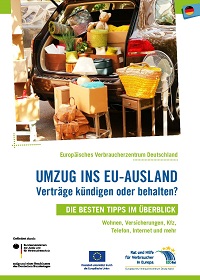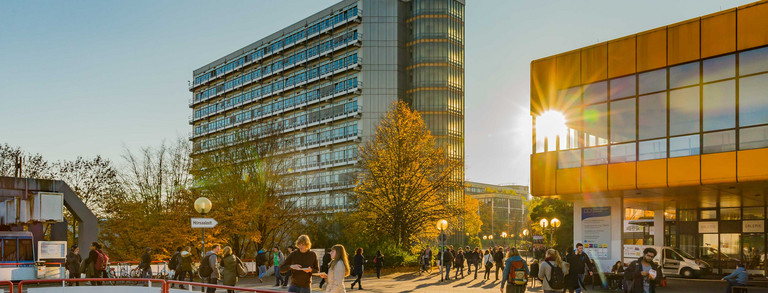Checklist for Your Stay Abroad
Whether you are going abroad for an internship or a study program, you will find helpful tips and important information here about everything you need to do before and after your stay abroad.
First Steps - Before You Apply
What's better for you: study or working abroad? Usually you can assume that the host university - especially in an exchange program - will offer a high level of support with orientation days and excursions, organizational support and help with accomodation. Outside of exchange programs, though, it can be difficult to find a scholarship.
An internship abroad has to be organized much more independently; you typically must find your own accommodation, and there are usually no events to help you get to know the region and the culture. The IAESTE program is an exception. Generally, an internship abroad is normally more suited to the end of your studies when you can work more independently. There are usually several internship scholarships available even on short notice.
The video "Auslandsstudium oder lieber Praktikum mit Erasmus+?" can help you decide (in German).
German semester dates are very different from those at foreign universities!
The semester dates abroad do not typically match the semester dates at TU Dortmund University. Before you apply you should check the dates at the desired university and speak with your department about the possibility of taking exams at a later/different date.
It is usually not possible to miss the orientation phase at the host university. In exchange programs the orientation is mandatory. One solution: carry out an internship (in Germany or abroad) before semester abroad in order to be more flexible with the starting date.
With an internship abroad you may be able to decide yourself when you will start, which may give you more flexibility.
It is also possible to complete a study program and an internship abroad in one German semester. For example the study program could go from August/September to December and the internship January through March.
The best time to go in your degree program
Study abroad normally works well in the fifth semester, since many degree programs have electives in this semester that can easily be transferred from a foreign university. Generally, though, you may participate in an exchange program in the Bachelor from the third semester and in the Master from the first semester on.
Internships are usually better later in your studies, however scholarships may be available from the first semester on. Speak with the advisors in your department to find the best time.
The whole world is open - that can make it more difficult to decide where to go. The International Office can help you during the advising hours.
Read testimonials (most in German) to better understand everyday life in various countries.
Find out what the language requirements are. You need to be sure that you can follow classes or carry out your work in the host country in English or German if you do not speak the host language. Make sure that enough courses are available in a language you understand. For an internship you should make sure that you can communicate with your fellow employees.
Be open for new things and non-touristy places, as these are often the places where you will get to know the local culture and people better.
Calculate a budget: TU Dortmund University's partners abroad often will waive tuition fees. In the Erasmus+ program students additionally receive a monthly stipend. Note the lower travel and visa costs in the Erasmus+ countries. Read the DAAD's country-specific information (in German) to find more information about the cost of living in various countries.
Even though some study and internship programs only require English, you should not go abroad without having at least basic skills in the host country's language. In some countries English will not get you very far when communicating with the locals.
Learning Languages in Dortmund: Foreign Languages Department at TU Dortmund University
Foreign Language Courses
The Department of Foreign Languages' website offers courses free of charge for TU Dortmund University's students. You'll need to sign up for classes about four weeks before the start of the semester.
Tandem Language Learning
In the tandem program you can work on your language skills with a native speaker while that person learns your native language from you. The communication is bilingual and both partners have equal time in each language.
Academic Writing and Presentations (German/English)
The offer from the Department of Foreign Languages / w.space includes regular classes, workshops and individual consultations throughout the semester.
Learning Languages Online
Erasmus+ Online Language Support (OLS)
Students who are chosen for the Erasmus+ Program (studies or internship) may register on the EU's Online Language System (OLS), which offers free language tests and courses for any official EU language as well as Icelandic, Macedonian, Norwegian, Serbian and Turkish and is available to you for several years. The courses are especially helpful for everyday language in a country in which the language differs from your working language.
Learning Languages Abroad
DAAD Catalog: Language Courses Abroad
The DAAD catalog of language courses (in German) has information about language courses at universities throughout the world.
Language Program Scholarships
Sprachreisen.org and Sprachreisen-Ratgeber.de award Globetrotter scholarships of 1,000 EUR twice a year for language programs abroad. The company Education First also offers the "EF Sprachreisenstipendium".
Many institutions abroad require a language certificate in the application. Sometimes the DAAD Language Certificate, which is offered free of charge at TU Dortmund University, is accepted.
DAAD Language Certificate
The DAAD Language Certificate can be used for any DAAD program, but also many universities and employers accept the certificate as proof of your language level. Register online for a test appointment in the Department of Foreign Languages.
Language Tests Outside of the University
TU Dortmund University students can take the Test of English as a Foreign Language (TOEFL) in Dortmund or in any other test center or even online from home. Information about the next test dates (2-3x/month) and registration are available on the ets website. The Chamber of Commerce offers a prep course for the test. The computer-based Cambridge Test and IELTS can also be taken in Dortmund, among other places.
Since scholarship application deadlines can be very early, you should start planning a study abroad about 1.5-2 years in advance and an internship abroad about one year in advance.
If you are involved in international activities and honing your intercultural skills, for example by taking language courses, going abroad or volunteering in a buddy program, you can receive the Certificate "Studium International" .
Especially by getting involved in a buddy program or in an international club you'll be able to not only help other students at TU Dortmund University but also build your own intercultural and soft skills.
Usually when applying to a foreign institution you will need to turn in an English transcript of records.
Students in the Overseas Exchange Program must use the template under the link below.
For all other students: For most degree programs it should be possible to generate an English transcript in BOSS. This PDF document can usually be sent to the host institution without a signature or stamp. If necessary, the Examinations Office can issue a (signed/stamped) transcript. Please check there if you need a signed transcript or if your GPA needs to be included in your transcript.
If you are unable to have an English transcript generated through BOSS or the Examinations Office, please use the following template:
- read this sample document first!
The templates are deliberately read-only. Please only enter your data and leave the file in Word format. The International Office will adapt the layout afterwards. - Bachelor Transcript of Records
- Master Transcript of Records
Process
It may take up to four weeks to process your transcript, so please turn in everything on time so as not to miss your deadline. In case your deadline ends earlier: Send the transcript that you translated/filled out to the host institution as an "unofficial transcript" and hand in the official and signed document later.
- Please read the information in the sample document first.
- Send your current Certificate of Enrolment as well as proof of all grades (BOSS, certificates, "Studienbuch", etc.) together with the filled in template to transcripts@tu-dortmund.de
- Do not forget to let us know the following information in your e-mail:
- Have you already checked in BOSS to see if you can generate an English transcript?
(The website has to be switched to English for this.) - University/company to which you are applying?
- City and country?
- Planned dates for the stay abroad?
- If the stay abroad has been organized through a placement agency, which one?
- Have you already checked in BOSS to see if you can generate an English transcript?
- The signed PDF will be sent to you through e-mail.
Before You Go Abroad
Apply for Auslands-BAföG at least 6 months before the start of your stay abroad, even if you do not receive BAföG in Germany.
Funding through Auslands-BAföG:
- As a stipend: necessary tuition fees (up to 5,600 EUR)
- As a loan (50%): travel costs (up to 1,000 EUR), health insurance, and a monthly payment for living expenses (country-specific)
Scholarships of 300 EUR or more per month may lead to less funding in Auslands-BAföG. The Erasmus+ Social Top Ups for students with special needs/chronic illness or children are an exception.
The Studierendenwerk Dortmund is not responsible for Auslands-BAföG. On the website you can find the Studierendenwerk that is responsible for your host country. Tip: You may apply in advance for a decision on the eligibility of the stay abroad (esp. important e.g. for the funding confirmation for self-organized stays).
is available from the Federal Ministry of Education and Research (in German).For study abroad it is a good idea to apply for TU Dortmund University's partner institutions, since the exchange program includes a full tuition waiver. In the Erasmus+ Program for an internship or study abroad, you will also receive a monthly grant for living expenses.
You may apply for several scholarships at once to increase your chances. However, you are only able to keep one scholarship. Auslands-BAföG can be combined with scholarships. The responsible person in the International Office can assist you if you are not sure what can be combined with your scholarship.
You can find more information online about scholarships for the following stays abroad:
It is a good idea to also read the country-specific information from the DAAD (in German): These pages give an overvew of the expected costs in all countries across the world as well as a comprehensive overview of scholarships for each country.

You are going abroad for one or two semesters and are not sure which contracts need to be cancelled and what else needs to be done? Answers to these and other questions can be found in the brochure "Umzug ins EU Ausland: Verträge kündigen oder behalten?" from the Zentrum für Europäischen Verbraucherschutz e. V. (in German).
Looking for a Subtenant? - Housing Anywhere Can Help!
TU Dortmund University cooperates with HousingAnywhere.com, an international accommodation platform for students. You may offer your room or apartment up for a sublease for exchange students coming to Dortmund. Register online with your university e-mail address to use the platform for free. Further information about the platform can also be found in this presentation by Housing Anywhere. Do not forget to inform your landlord about your plans.
We cannot guarantee that you will find a subtenant! You will increase the chances of finding a subtenant if the months of your offer match TU Dortmund University's semester dates (e.g. September/October until February for the winter semester and March/April until July for the summer semester).
Questions and feedback can be sent to Miriam Gothe-Kräher in the International Office.
Looking for a Room Abroad?
Below you will find housing portals that other students have used.
Important: We recommend, however, that you research the providers yourself and try to only use secure/verified platforms for your search. Returning students have also advised to wait until you are in the host city to look for an apartment/room in order to avoid surprises (e.g. with regard to cleanliness, fraud, etc.). The safest - if not necessarily the nicest - option is always the accommodation offered by the host institution, should it have rooms in dormitories. This way you can avoid many problems and stress.
In order to avoid online scams read through these guides from Housing Anywhere (English) and the Verbraucherzentrale NRW (in German).
Housing Anywhere
You can also use the Housing Anywhere platform for your own stay abroad in over 400 cities across the world. Registered students from Housing Anywhere's partner universities receive special service and tips. Further information about the platform can also be found in this presentation by Housing Anywhere.
Further Options Across the Globe
Please have a look at our German page to find further options listed by country.
In important to be properly insured while abroad, and a simple travel health insurance is typically not sufficient. Compare offers from several companies before you make a decision.
Even during a stay abroad, you still must retain valid health insurance for Germany in order to remain enrolled at TU Dortmund University. This could mean, espcecially for an overseas stay abroad, that you are actually insured twice - in Germany and abroad. Discuss your possibilities with your health insurance provider.
Students who receive a DAAD scholarship or are placed abroad through one of the DAAD programs (e.g. Erasmus+, PROMOS, Go East, IAESTE, AIESEC, etc.) may choose to take out a policy through the DAAD insurance offer.
How will you access money during your time abroad? For most countries it would be a good idea to have a credit card, especially one from a German financial institution. Try to find an offer for a free credit card that does not charge any fees for international ATM withdrawals. Compare offers from various banks and financial service institutions to find the best deal.
Refund for the SemesterTicket for Public Transportation
Even if you do not apply for a leave of absence, you may apply through AStA before your stay abroad for a refund for the unused months of the student ticket for public transportation.
Leave of Absence (Beurlaubung)
Students who go abroad for their studies or an internship can apply for a leave of absence from the university if you will be absent for at least 50% of the lecture period. During this time your program semester (Fachsemester) does not change. If, for example, you are abroad from the beginning of January until the beginning of May, a leave of absence is not possible for either semester. However, if you stay abroad until the end of June, for example, a leave of absence would be possible for the summer semester (but not for the winter semester).
- During a leave of absence you may not participate in exams at TU Dortmund University unless taking a repeat exam.
- You may not take a leave of absence if completing an internship or practical training or stay abroad that is obligatory for your studies and for which you intend to receive ECTS.
- A leave of absence is possible in the Bachelor from the second semester and in the Master from the first semester.
- Students in an exchange program will not automatically be registered for a leave of absence by the International Office and must apply themselves.
The Student Registration Office can help with any questions.
Steps to Apply for a Leave of Absence:
- Download the Application for a Leave of Absence from the Student Registration Office (in German).
- When you turn in your application you will also need to turn in a certificate from the International Office confirming the duration of your stay abroad.
If you are not participating in an exchange program, please send an e-mail to going-abroad@tu-dortmund.de with your letter of acceptance from the host institution or your work contract as well as your current certificate of enrollment from TU Dortmund University in order to receive a certificate. - Transfer the social contribution (Semesterbeitrag) amount listed on the application for your specific leave of absence reason. After the re-registration deadline ("Rückmeldefrist") a late fee is due.
- For study abroad: Select the reason "Studium an einer ausländischen Hochschule" and also turn in a certficate about the duration from the International Office.
- For an internship abroad: Select the reason "Praktika" and turn in a copy of your work contract (in German or English) as well as a certificate from your department or the International Office confirming the duration and the necessity of the internship.
- Turn in all complete documents within the deadline to the Student Registration Office.
Please Note: The application for a leave of absence is only valid for one semester. If you are requesting a leave of absence for two semesters, you will need to turn in a new application with all complete documents during the re-registration period for the corresponding semester. This can be done through mail or in person (you may officially authorize someone else to do this for you - please note the special instructions for this on the application).
Leave of Absence and Transfer of Credit from Abroad
Usually credits earned abroad can be transferred to your degree program in Dortmund, even during a leave of absence. Discuss this option with the lecturers and examinations board in your department. Further information about this can be found below ("After Your Stay Abroad").
Studying abroad should give you new insights into your subject and coud be a great opportunity to set a specific concentration in your studies that could be attractive for a future employer. The classes you take abroad may be eligible for recognition in your studies at TU Dortmund University. This should be discussed with your academic advisor before you go abroad.
The LABG Stay Abroad (Lehramt Englisch) must be approved before departure through the Stay Abroad Team in the department (via Moodle).
Important Information about Credit Recognition
- Speak with the lecturers and advisors in your department about your plans before you go abroad.
- Since many universities do not publish their course catalogs until shortly before the start of the semester, have a look at past course catalogs in order to see what types of courses may be offered when you are there.
- Choose more courses for the Learning Agreement than you would actually be able to take so that you have back-up classes in case the class schedule is changed or certain classes cancelled.
- Read the information on the "Study Abroad & Recognition" page.
Learning Agreements
- Erasmus+ Learning Agreement for Study Abroad (mandatory template from the EU Commission)
- Erasmus+ Learning Agreement for Internships Abroad (mandatory template from the EU Commission)
- Learning Agreement for Study Programs Outside of Erasmus+ (binding, but not mandatory)
Typically for all countries outside of the EU you will need a visa in order to study or work/volunteer there. You will usually need your admission documents from the host university or your invitation or work contract from the company in order to apply for a visa. Gather all the information you need directly from the embassy or consulate for the host country. This process can take several months, so start early.
For an internship abroad, please also read this additional information.
Please note that the International Office cannot offer visa advising!
International students who would like to go abroad for studies or an internship may even have to apply for a residence or work permit for EU or Schengen countries. Please check with the country's official offices. Please note that you will also need to inform the Ausländerbehörde in the city in which you live of any longer stay outside of Germany. Failure to do so could lead to an annullment of your visa for Germany!
Unless you are prepared to pay for changes to your travel plans, we do not recommend booking flights or trains until you have received your invitation/admission letter and, if necessary, your visa.
Some consulates may offer expedited services for a higher fee. Please note that the International Office cannot help with visa applications, as this is a matter only for the consulates.
Consider making sustainable travel arrangements with our tips.
Do you have to provide proof of good conduct at your place of work? This is typically the case for school internships and projects that involve contact with children. Apply for a certificate of good conduct (Führungszeugnis) from the Federal Office of Justice. The certificate of good conduct is issued in German, English and French, so you will not usually need another translation, but ask your internship host about their requirements.
Important: Regularly check the webpage of the host country's consulate for the most up-to-date arrival and immigration information, since this information can change at any time.
For some stays abroad you may need to have a medical certificate, especially to study abroad in certain countries (e.g. in Asia). For some universities this certificate is included in the application documents and for others the certificate should be issued no earlier than two months before arrival. Your host institution can give you more information about their requirements so that you can make an appointment with your doctor.
Vaccinations
Find out which vaccinations are necessary for your stay abroad since the process for some vaccinations can take up to six months. Check with your host institution about their vaccination requirements and discuss the vaccination recommendations for your travel region with your doctor.
Some countries have especially strict rules regarding the type of Covid-19 vaccine. Be sure to check the quarantine and vaccination requirements for the country and the city in which you will be living.
Information and Travel Warnings from the Federal Foreign Office
Regularly check the homepage of the Federal Foreign Office to stay up-to-date on the situation in your host country, especially regarding travel warnings. Also register with ELEFAND for every trip - touristic or academic - so that you can be informed quickly by the German diplomatic missions abroad in the event of a crisis or disaster and, if necessary, be involved in crisis management measures.
Also read these important notes from the DAAD on traveling safely.
The DAAD's "studieren weltweit – ERLEBE ES!" campaign aims to inspire students and young people to go abroad. Students from Germany share their experiences abroad online. Authentic, real and live. All contributions flow together on www.studieren-weltweit.de.
New correspondents are selected twice a year and then invited to a mandatory (online) preparation workshop, where they get to know other correspondents and are trained for their task (professional training in the use of social media). They are also given a smartphone and a monthly honorarium.
The application is done via the DAAD's online form (in German) and typically due in May for the fall semester and November for the spring semester. Please refer to the conditions for participation.
After Your Stay Abroad
Help other students who are just starting their planning or are not sure what to do and where to go. You can submit the report via e-mail.
In case the file size is too large please use Sciebo to send the report.
For Erasmus+ Study Abroad (only classes at a university, not for (research) internships):
For the Overseas Exchange Program/Overseas Short-term Programs:
- Report Template
Please try to send this back only as a PowerPoint and not a PDF - Consent Form
For Internship Programs (also Ruhr Fellowship and research internships at a university):
- Report Template
Please try to send this back only as a PowerPoint and not a PDF - Consent Form
Approximately one to four months after completing classes at the host university, you will be issued a Transcript of Records. Start discussing the recognition of study achievements right away with your department.
- Information from the Examinations Office on the recognition of study achievements and on final documents (such as the Diploma Supplement) at the end of your studies (in German)
- Flyer from the Hochschulrektorenkonferenz (HRK) (in German)
- Further information under "Study Abroad & Recognition"
If there are problems with the recognition of your grades (despite previous arrangements in the Online Learning Agreement), please contact the complaints manager in your department .
Calculating Foreign Grades for the German System
The grade conversion for grades earned abroad is done by your department according to the so-called "Aachener Table". This serves as a guide for the departments when converting foreign grades into the German system. Since not all countries are included in the table, you may be referred to the International Office. In this case, the Admissions Department of the International Office is responsible for converting the grades into the German grading system. This department also follows the Aachener Table and can give further recommendations for other countries. For this purpose, please fill out the Grade Calculation Form and send it with a scan of your Transcript of Records in pdf format to the Admissions Office. Be sure to scan all relevant pages of your Transcript of Records (including the reverse side). You will receive your grade conversion through e-mail and can then discuss course credit approval with your faculty.
Calculating Credits for the "European Credit Transfer System" (ECTS)
Foreign universities outside of the EU give "credit points" for your classes; these credit points may not be comparable with ECTS, a system which is based on workload. The workload comparability must be discussed with the lecturer (or the responsible person or office in your department).
Please note: The International Office may only make suggestions for credit transfer to your department, however the final decision lies with the department.
If you received a scholarship from TU Dortmund University for your stay abroad, you will need to turn in certain documents in a timely manner in order to retain the scholarship. You will find the mandatory documents in your scholarship acceptance form (Annahmeerklärung/Grant Agreement) or in the corresponding scholarship description:
You profited from an excellent support system during your stay abroad and now you want to help out students in a similar situation here in Dortmund? You want to work on your intercultural skills and also get to know people from other cultures? Volunteer to help out in the international programs and activities on campus - many of the activities also count towards the Certificate "Studium International".
Share your experience abroad with school children! Through the "Back to School" and "Europa macht Schule" programs from the German Academic Exchange Service (DAAD) you have the opportunity to design a project and let young people profit from your knowledge and experiences. You can also volunteer with the "Europa macht Schule" local team in Dortmund to contribute to intercultural understanding and gain experience in project management. These programs are open for all returnees, regardless of the country in which your stay abroad took place.
The DAAD has also created this guide for students after their stay abroad (in German) to help you find the right DAAD volunteer opportunity for you.
Students in a second degree program (master students or e.g. bachelor students who have already completed a vocational traineeship) can write off their stay abroad in the tax return application, however there are very strict requirements for this. Research your possibilities, and hold on to proof of all payments from your stay abroad.
Sometimes tax seminars for students are offered in Dortmund on this topic.
Contact
E-mail Inquiries
General inquiries and internships: going-abroad @tu-dortmund.de
Erasmus+ studies and BIPs: erasmus-outgoings @tu-dortmund.de
Office Hours
General Inquiries - Outgoings (Studies/Internships/Short Programs):
Open office hours (no appointment necessary) with Laura Hope via telephone / Zoom
Tel.: +49 231 755 4728
Mon 10:00-11:30 und 13:30-15:00
Tue 10:00-11:30 und 13:30-15:00
Do you need to speak to us in person?
Office hours in presence only with an appointment
Erasmus+ Study Abroad & BIPs:
Office hours via telephone/zoom with Hella Koschinski by prior arrangement
Tel.: +49 231 755 6247
Office hours in presence: only with appointment
Tue 9:00-12:00













![[Translate to English:] Checkliste [Translate to English:] Eine Person schreibt eine Checkliste](/storages/international/_processed_/4/d/csm_Checkliste_ToDo_glenn-carstens-peters-RLw-UC03Gwc-unsplash_bbb6777c98.jpg)

